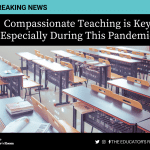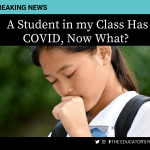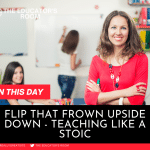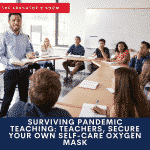
Dr. Helen Hoffman is a veteran teacher, author, and advocate for better schools. With 30 years of teaching at both the high school and college level, Helen’s mission is to shape the future of education by helping teachers create school experiences that are more engaging, enjoyable, and purposeful than our current ones. Her new book, No More Back To Normal – On To Better Schooling, is an essential guide aimed at enabling teachers to reimagine their classrooms and implement immediate change. Helen holds an M.A. in English from the University of Chicago and a Ph.D. in Theatre from Northwestern University. A parent and grandparent herself, Helen’s own family has shaped her ideas and understanding of learning.
Covid schooling—a bowl full of lemons
Last fall in my school district, administration and school board members outdid themselves in putting together a pandemic plan for opening schools. They prepared for creating small classes, for sanitation, for wearing masks and social distancing, for identifying infections, for dealing with outbreaks, for bussing, for incorporating the option of full-time online learning, for all sorts of ways to try to maintain a safe environment and to provide choices.
There was an uproar in response—including a few death threats—though many were relieved at the prospect of a return to in-class school.
Two weeks after the board approved the plan, the rates of positive results from testing and numbers of deaths in our area started to increase, and the district felt forced to move to propose full-time, at-home, online learning. There was another uproar in response.
Since then, the in-class school has wavered, on-again, off-again. High schools have tried going hybrid. All sorts of options have been attempted. But nobody seems happy; no options seem tolerable. There is not a good vehicle for learning among them. They are all lemons.
So, we are advised, let’s make lemonade. Some kind of schooling is happening. We’ll just have to make the best with what we’ve got.
This gets me to the real issue. The biggest problem in my mind is that, in the necessary move to focus on how to provide safe spaces for schooling, not enough attention is being paid to the schooling going on—in any space we can provide.
[bctt tweet=”The biggest problem in my mind is that in the necessary move to focus on how to provide safe spaces for schooling, not enough attention is being paid to the schooling going on—in any space we can provide.” username=””]
But we can do better than settle for making lemonade out of lemons. We can take this time to pay attention to schooling as a vehicle for learning. This is our chance to rethink what we teach and how we teach it. Teachers can no longer just rely on what and how they have always taught. It has become clearer and clearer that students are all in different places regarding knowledge and skills. It’s not effective to just instruct them all in the same things at the same time.
It never was.
In fact, we’ve been working with lemons for some time. We’ve learned that typical instruction focusing on covering and testing content has not proved to be effective even in traditional classrooms for developing the high-level skills and the 21st-century competencies we have come to value. Nor has it succeeded in engaging a lot of students in learning. With students online from home, the effects of such instruction have proved to be even worse.
So, we need to do far more than adding a bit of sugar and water to what we have to make it more palatable. I like lemonade as much as the next person, but it is not a source of rich nutrition. It is not a recipe for deep learning.
Rather, we can start by exploring what is interesting about the lemons we have, how they came to be, what we can use the juice, the pulp, the pith and rinds for, and where we can move on explore other fruits and sources of learning.
We now have an opportunity to re-envision schools and schooling, wherever it happens, as opportunities for exploration and inquiry. We can move beyond instructing lists of learning targets to fostering experiences of deep and engaging learning. This doesn’t mean abandoning what we have learned over the years that are important to know or that we need to change everything that we have done in the past. But it does mean questioning our past assumptions and methods as we deal with schooling during and, more especially after, the COVID crisis.
[bctt tweet=”We can start by rethinking the curriculum.” username=””]
Creating a curriculum for deep and relevant learning—exploring the essence and uses of our lemons (and other fruit)
Here’s an essential question I’d have educators begin with: How can we adapt what we teach to engage students in deep and meaningful learning?
Or, how can we take the lemons we have, find their uses, and discover how they reinforce or work with other fruits of learning?
Educators have been encouraged to grit their teeth and attempt to somehow cover the usual lists of standardized learning targets, including those that students may have missed in the scramble to online learning last year. But now is the time for something different.
We can’t cover all the usual content—we never could. But we can engage students in learning about content—not by exhaustively instructing them on facts and procedures that we fear they will not remember, but by exploring with them topics that we consider important and that are, at the same time, both useful and interesting to students.
To do this, educators need to ask themselves two big questions:
- How can we recast content and activities to respond to students’ different interests and knowledge in the present moment, focusing on their learning now and moving forward, not on reflexively addressing assumed learning losses or gaps?
- How can we foster students’ continuing development of essential content and competencies as they explore and create?
We can address these questions by developing flexible learning pathways through content areas that engage students in exploring to solve problems or answer questions that concern them. For instance:
- How to use particular math skills to build something students want to build or to understand the COVID 19 data of their community.
- How to use scientific and economic knowledge and skills to improve a recycling program or protect a chosen habitat.
- How to apply historical and political knowledge and skills to understanding and dealing with democracy or racism or injustice as students experience these issues.
- How to use literacy, literary and artistic knowledge, and skills to create, interpret, and appreciate chosen works of literature and art that speak most profoundly to individual students.
- How to use rhetorical, speaking, writing, graphic, and technological skills to communicate clear and meaningful arguments that students choose to make to share their learning with interested audiences.
You may notice that all of these pursuits are cross-curricular. And all require students to dive deeply into the content and concerns of various disciplines. By working together and with their students to create such explorations and inquiries, teachers can help students connect disciplines and deepen their learning.
Creating flexible learning pathways—exploring and making use of the fruit we discover
Here’s another essential question I’d have educators explore: How can we adapt how we teach to engage students in deep and meaningful learning?
Rather than creating a series of linear lesson plans that cover required content and discrete skills for students to remember and demonstrate on-demand, educators can develop a more powerful approach, designing flexible pathways for students to follow. Indeed, unless we are willing to be satisfied with what we know isn’t working for so many students, we have to explore and experiment.
Whether online or newly returned to face-to face (or mask-to mask) teaching, teachers need to explore with their students what activities to try, resources to investigate, questions to discuss, and problems to solve. With student involvement, teachers can focus on developing projects to engage students in their own explorations within and across different content areas. Some explorations will work better than others, but all can be continuously adapted to engage students in delving ever deeper into topics of interest to them, even when working within required areas of instruction.
Students thus devise their own recipes for lemonade and find their own uses for lemons—integrating that knowledge with whatever else they have discovered as they explore and offering up their discoveries for others to sample.
Benefits of rethinking what and how we teach–discovering the multiple virtues of lemons and the world around them
While project explorations may often include typical instruction and classwork, they work to a larger, more important purpose and offer student choice and agency opportunities. And the focus on the process of exploration and discovery, rather than on particulars of content, better engages students in learning deeply. As they explore, students:
- Discover essential content knowledge related to their interests
- Develop reading, disciplinary, and critical thinking skills
- Refine and use communications skills to share their learning authentically
- Develop social/emotional competencies such as collaboration, self-reflection, independent learning, and responsibility
Essential knowledge
Instead of requiring lists of facts and concepts to be passively taken in and remembered by students, learning explorations can engage students actively in discovering essential knowledge of different subject areas as they ask their own questions, discover answers, and share what they discover as they learn. Traveling along such pathways, students explore their questions about such things as:
- The causes and effects of an event or movement in history and its relevance to today
- How and why something occurs in science, or government, or economics
- How math can be applied in particular problems or situations
- How literature and the arts (fine and practical) speak to or gratify audiences
- What makes a lemon a lemon, how it grows, why it grows where it grows, its effect on nature, its values as a flavor in cooking
Reading and disciplinary and critical thinking
As they explore flexible learning pathways, students practice and develop the tools needed to learn to their own purposes and about their own passions. Activities and assignments that lead to exploration provide experiences in which students:
- Read to learn about their chosen topics or questions or to appreciate stories and poems in literature, thus developing reading skills.
- Use critical thinking skills to understand, analyze, and evaluate what they discover as they are learning.
- Apply disciplinary strategies and ways of thinking to make sense of what they encounter
- Experiment with recipes to create the perfect lemon meringue pie
Communication skills
Assignments and assessments can be focused on students integrating and sharing what they consider to be important learning. Students can go beyond simply demonstrating communication skills and exhibiting knowledge to:
- Communicating to their own purposes in chosen disciplines—to say what they want to say to the audiences they want to say.
- Refining and developing their communications over time and with guidance to communicate as effectively as possible.
One student might develop a presentation in which she recounts and connects stories from her research to share what she has learned about the importance of lemons (and other citrus fruits) to maintaining the health of seafarers in the past and making possible voyages of exploration. Another student might want to create a formal presentation that uses graphs and pictures to show what he has discovered about the value and effects of vitamin C and its works in the human body.
They can share their learning with all concerned so that everyone benefits from each other’s learning.
Social/emotional competencies
Pathways can be designed to provide opportunities for students to develop social and emotional competencies as they learn. As students learn content, develop skills, and create communications, they can at the same time:
- Work together
- Reflect for themselves and on themselves
- Have meaningful input into what and how they learn and how they are assessed—thus having agency in their study of lemons or whatever they are interested in.
Beyond lemonade
We don’t have to settle for lemonade in our schools. We can work together—teachers, parents, students—to explore what we deem to be important and students find interest. To focus on process, discovery, and communication. On making connections and integrating understanding. On collaborating to do so and honoring the concerns and questions of all involved. We can take our lemons, learn deeply about them, branch out into new fruitful subjects, and make something more educationally nutritious than lemon-flavored sugar water.






